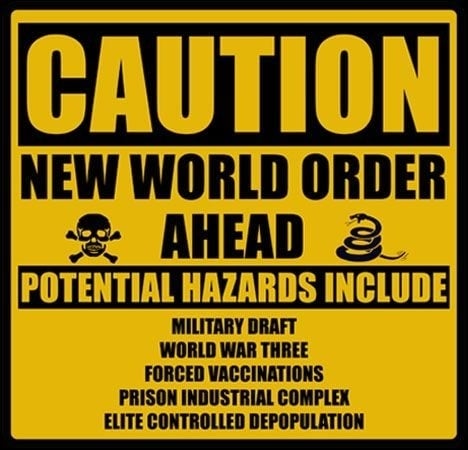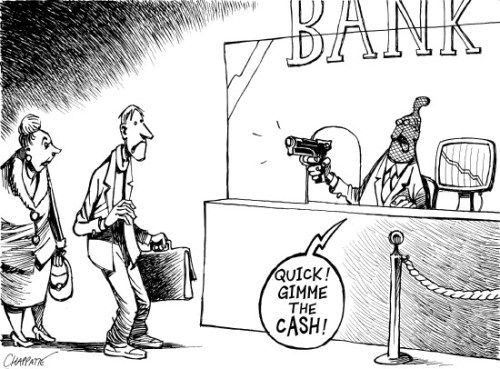“Ian Bremmer, NYU professor and head of the geopolitical consulting powerhouse Eurasia Group, consults at the highest levels with both governments and companies because he brings to the table robust geopolitical analysis and a compelling thesis: that we are witnessing “the creative destruction of the old geopolitical order.” We live, as his last book told us, in a “G-0” world. In today’s Outside the Box, Ian spells out what that creative destruction means in terms of events on the ground today. As Ian notes, the most prominent feature of the international landscape this year has been the expansion of geopolitical conflict. That expansion is gaining momentum, he says, creating larger-scale crises and sharpening market volatility.
Hold on to the reins now as Ian take us for a ride with the “Four Horsemen of the Geopolitical Apocalypse.” (For more information about the Eurasia Group or to contact Ian Bremmer, please email Kim Tran at [email protected].)
We’ll follow up Ian’s piece with an excellent short analysis of the Iraq situation from a Middle East expert at a large hedge fund I correspond with. Pretty straightforward take on the situation with regard to ISIS. This quagmire has real implications for the world oil supply. (It appears that the Sunni rebel forces are now in complete control of the key Baiji Refinery, which produces a third of Iraq’s output.)
Back in Dallas, it’s a little hard to focus on geopolitical events when seemingly all the news is about ongoing domestic crises. But the outrageous IRS loss of emails doesn’t really affect our portfolios all that much. What happens in Iraq or with China does. There’s just not the emotional impact.
One domestic humanitarian crisis that is brewing just south of me is the massive influx of very young children across the US-Mexican border. When this was first brought to my attention a few weeks ago, I must admit that I questioned the credibility of the source. We have had young children walking across the Texas border for decades but always in rather small numbers. The first source I read said that 40,000 had already come over this year. I just found that to be non-credible, but then with a little reasonable research it not only became believable but could be a bit low – it looks as many as 90,000 children will cross the border this year.
What in the name of the Wide Wide World of Sports is going on? First of all, how do you cover up something of this magnitude until it is a true crisis? When the administration and other authorities clearly knew about it last year? (The evidence is irrefutable. They knew.)
I am the father of five adopted children. In an earlier phase of my life, I was somewhat involved with Child Protective Services here in Texas. It was an emotionally difficult and heartrending experience. (One of my children came out of that system and three from outside of the United States). I have no idea how you care for 90,000 children who don’t speak the language and have no connection to their new locale. Forget the dollar cost, which could run into the tens of billions over time. These are children, and they are on our doorstep and our watch. You simply can’t ignore them and say, “They are not supposed to be here, so it’s not our responsibility.” They are children. Someone, and that means here in the US, is going to have to figure out how to take care of them, even if it is only to learn why they try to come and figure out where to send them back to. And frankly, trying to to send them back is going to be a logistical and legal nightmare, not to mention psychologically traumatic to the children.
Maybe someone thought that waiting until there was a crisis to let this information slip out (and we found out about it because of photos posted anonymously of children packed together in holding cells) would create momentum for immigration reform. And they may be right. But I’m not certain it’s going to result in the type of immigration reform they were hoping to get.
I have to admit that I’ve been rather tolerant of illegal immigrants over the course of my life. There are a dozen or so key issues that I think this country should focus on, but I’ve just never gotten that worked up about illegal immigration. The simple fact is that everyone here in the US is either an immigrant or descended from immigrants. It may be, too, that I’ve hired a few undocumented workers here and there in my life. As an economist, I know that we should be trying to figure out how to get more capable immigrants here, not less. What you want are educated young people who are motivated to create and work, not children as young as four or five years old who are going to need housing, education, adult supervision, healthcare, and most of all a loving environment where they can grow up.
It is one thing for undocumented workers to come across the border looking for jobs or for families to come across together. It is a completely different matter when tens of thousands of preteen children come across the border without parents or supervision. They didn’t get across 1500 miles of desert without significant support and a great deal of planning. This couldn’t be happening without the awareness of authorities in Mexico and the Central American countries from which these children come, and if this is truly a surprise to Homeland Security, then there is a significant failure somewhere in the system.
And if it was not a surprise? That begs a whole different series of questions.
This is a major humanitarian crisis, and it is not in the Middle East or Africa. It is on our border, and we need to figure out what to do about it NOW!
I don’t care whether you think we need to build a 20-foot-high wall across the southern border of the United States or give amnesty to anyone who wants to come in (or both), something has to be done with these children. It is a staggering problem of enormous logistical proportions, and we have a simple human responsibility to take care of those who cannot take care of themselves.
And on that note I will go ahead and hit the send button, and let’s focus on the critical geopolitical events happening around the globe. Iraq is a disaster. Ukraine is a crisis. What’s happening in the China Sea is troubling. It just seems to come at you from everywhere. Even on a beautiful summer day.
Your stunned by the magnitude of it all at analyst,
John Mauldin, Editor
Outside the Box[email protected]
(From Ian Bremmer)
dear john,
we’re halfway through 2014, and the single most notable feature of the international landscape has been the expansion of geopolitical conflict. why should we care? what’s the impact; what does it mean for the global economy? how should we think about geopolitics?
my thoughts on the topic, looking at the four key geopolitical pieces “in play”–in eurasia, the middle east, asia, and the transatlantic.
geopolitics
i’ve written for several years about the root causes of the geopolitical instability the world is presently experiencing. a new, g-zero world where the united states is less interested in providing global leadership and nobody else is willing or able to step into that role. that primary leadership vacuum is set against a context of competing foreign policy priorities from increasingly powerful emerging markets (with very different political and economic systems) and a germany-led europe; challenges to the international system from a revisionist russia in decline; and difficulties in coordination from a proliferation of relevant state and non-state actors even when interests are aligned. all of this has stirred tensions in the aftermath of the financial crisis: instability across the middle east after a stillborn arab spring; a three-year syrian civil war; a failed russia “reset”; rising conflict between china and japan; fraying american alliances with countries like brazil, germany, and saudi arabia.
and yet geopolitical concerns haven’t particularly changed our views on global markets. each conflict has been small and self-contained (or the spillover wasn’t perceived to matter much). geopolitics has been troubling on the margins but not worth more than a fret.
that’s about to change. though perceived as discrete events, the rise of these geopolitical tensions are all directly linked to the creative destruction of the old geopolitical order. it’s a process that’s gaining momentum, creating in turn larger-scale crises and broader market volatility. we’ve now reached the point where near- to mid-term outcomes of several geopolitical conflicts could become major drivers of the global economy. that’s true of russia/ukraine, iraq, the east and south china seas and us/europe. in each, the status quo is unsustainable (though for very different reasons). and so, as it were, the four horsemen of the geopolitical apocalypse.
Russia/IUkraine….”
Full article
Comments »







